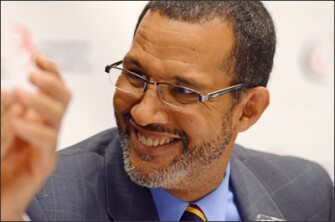The Prince George’s County public schools, a 124,000-student district that abuts the District of Columbia, has a new school board chairman familiar to the national education scene: He’s Segun Eubanks, the director of teacher quality for the 3-million member National Education Association.
Mr. Eubanks has two children in the Maryland district. He’ll keep his NEA job while chairing the board; the position began June 1.

Prince George’s County encompasses urban and suburban areas. It’s well known for being among the wealthiest predominately black communities in the United States, despite having pockets of poverty. And this has led to a growing class-based gap: As Ovetta Wiggins of The Washington Post has reported, middle-class families have been enrolling their children in private schools, rather than the district’s schools, because of their less-than-stellar reputation.
Dissatisfaction with the county’s schools and the school board’s squabbles recently led to new state legislation, signed into law in April, that established a brand-new governance structure in the district. The history here is pretty complicated, but traditionally, where schools were concerened, the county executive didn’t do much more than sign off on the district’s budget.
The new system isn’t quite mayoral control, but it does nod in that direction: Now, the county executive gets to appoint the district CEO and three members of the school board. One more is appointed by the county council; nine other board members remain elected.
Eubanks gained attention as a member on an advisory commission on education excellence set up by Rushern L. Baker III, the current county executive.
Now for the interesting part. The teachers’ union in Prince George’s County is an NEA affiliate, which means that Eubanks will be helping to set policies that affect his own employer’s members. Apparently, though, the appointment was given the blessing from the higher-ups at both the NEA and Prince George’s.
“I discussed it clearly internally with my own people, because I wasn’t going to take on a role like this without talking to them about what those optics look like,” Eubanks told me. “And I made it clear [to the executive] that there could be times and places where there could be real or perceived conflicts of interest, and I’d have to recuse myself.”
So far, “I’ve been very pleasantly surprised and warmed by the reaction from the school district, my union folks, my community folks, and the other members on the board,” he said. “To date, the only place I’ve heard criticism is in the comments section of the newspaper.” (Given the state of public discourse these days, he will probably have to get used to that last bit, unfortunately.)
Eubanks has kept a reasonably low profile at NEA national. But it’s worth noting that he has helped stretch the union’s usual orthodoxies in places. As a member on a 2012 federal rule-making panel, for example, Eubanks was one of the few negotiators who sought to bridge two very divided factions—those that were for and those that were against outcomes-based ways of assessing teacher preparation. His shop at the NEA is also engaged in a number of efforts worth watching, such as helping to design better systems for preparing new teachers.
The Prince George’s County school board’s top two priorities are boosting student achievement and improving parent and community engagement, he said. Among other things, it will look at options like expanding access to AP classes and board-certified teachers, and to try to improve community support and engagement in the schools.
“A majority of the people I know in my middle-income bracket send their kids to private schools,” said Eubanks. “Too many of these families have lost faith in the system.”
Photo Credit: NEA/Kevin Lock
